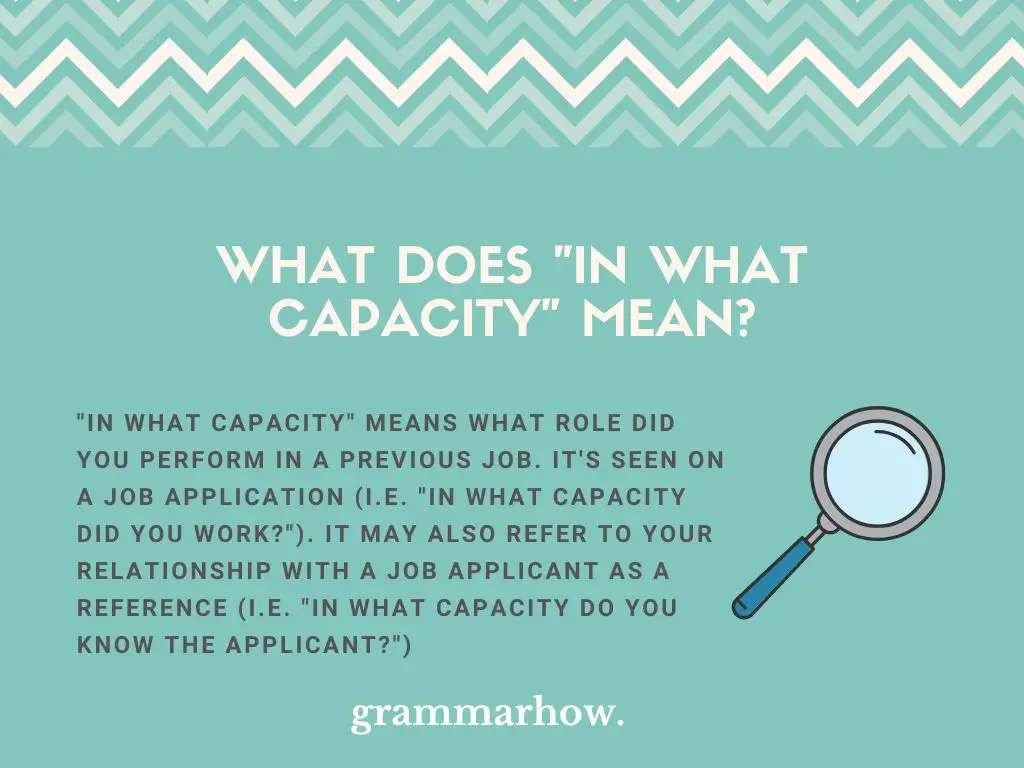“In what capacity” is fairly common jargon in job applications. You might have come across it before. If you were stumped by it or would like a thorough explanation, you’ve come to the right place. This article will explain all there is to know about “in what capacity.”
What Does “In What Capacity” Mean?
“In what capacity” means what role did you perform in a previous job. It’s seen on a job application (i.e. “in what capacity did you work?”). It may also refer to your relationship with a job applicant as a reference (i.e. “in what capacity do you know the applicant?”)

The two meanings are shown more clearly here:
- In what capacity did you work for this company?
- How long and in what capacity have you known the applicant?
It’s fairly common to see this phrase, so it’s best to get to grips with it first.
The question simply asks to what extent you’ve done something or how well you know someone. The meaning only varies based on whether you see the phrase in a job application or on a letter of recommendation.
Remember, on a job application, it’s asking for your previous work roles. In a letter of recommendation, it’s asking how well you know the applicant and why you know them.
“In What Capacity” On a Letter of Recommendation
Let’s start with the letter of recommendation variation. The meaning of the phrase here relates to your relationship with a job applicant.
You should answer the phrase by explaining how you have known the applicant (or how long). This will give their potential employer an idea of where your reference is coming from.
You can check these sample answers out to learn more about how you might answer them:
- In what capacity do you know the candidate?
- I was Sarah’s supervisor for three years while she worked at Brussels Corp.
- In what capacity do you know the applicant?
- I was his best friend in high school and have known him for fifteen years.
- How long and in what capacity have you known the candidate?
- I was his previous employer for six years.
Sometimes, the question might be asked to the applicant rather than the referee. The applicant may be asked to provide a referee’s contact details in such cases. You should answer in the same way by providing your relationship with them.
Here’s a simple way to answer if you are asked about the capacity in which you know your referee:
- In what capacity are you known to this referee?
- Former employee.
“In What Capacity” On a Job Application
“In what capacity” is a little simpler to understand on a job application. It refers to your role or function while in a previous job. This allows potential employers to look into your employment history to see if you’re a good fit.
It’s fairly easy to answer this question if you know the ins and outs of your previous job. It’s wise to familiarize yourself with your job description now if you’re planning on applying to jobs later.
Here are some sample answers to help you figure it out:
- In what capacity did you work for this company?
- I was an independent contractor for five years with this company.
- In what capacity did you work for them?
- I was a supervisor for three years and became the operations manager after that time.
- In what capacity did you work for your previous company?
- I was a cleaner for three months.
As you can see, you don’t have to go into much detail. Some job applications even give word or character limits, meaning you might be limited to how much you can include anyway.
You should try to be as clear and concise as possible on job applications. The sooner you can get the information across, the better it’ll look to a prospective employer.
Conclusion
“In what capacity” asks someone about their role or function in a company or someone’s life.
In a job application, it usually asks about a former job role. Answer it briefly by listing your job title, duties, and time at the company.
For job references, the meaning differs slightly. You should answer it by giving a summary of your professional (or personal) relationship with the applicant.

Martin holds a Master’s degree in Finance and International Business. He has six years of experience in professional communication with clients, executives, and colleagues. Furthermore, he has teaching experience from Aarhus University. Martin has been featured as an expert in communication and teaching on Forbes and Shopify. Read more about Martin here.
